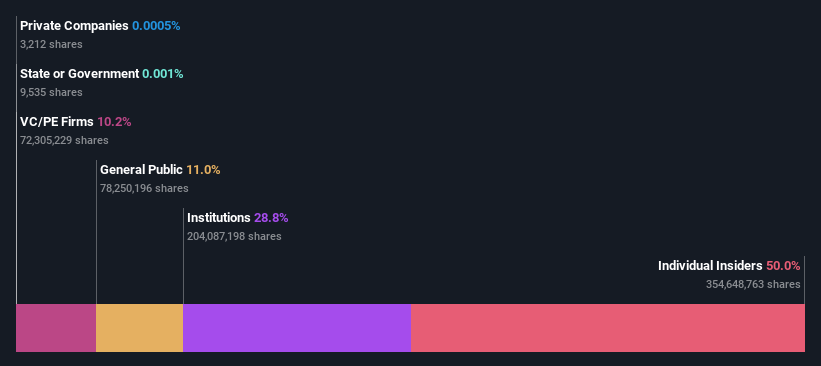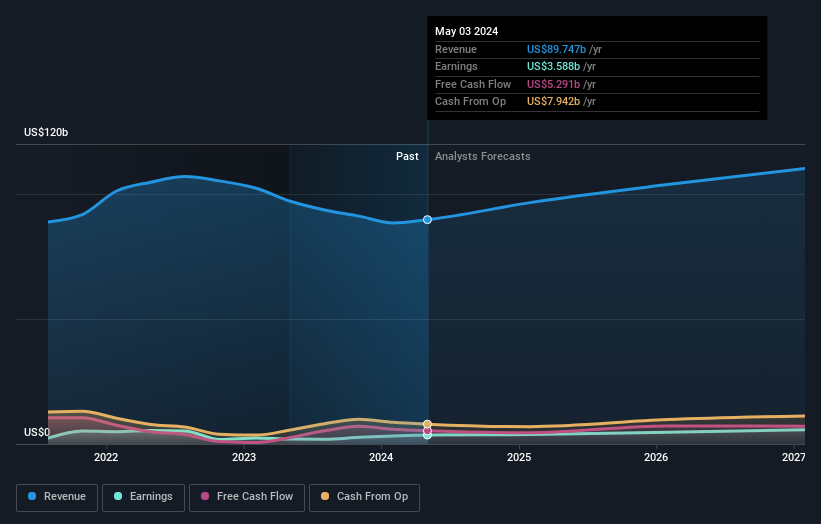Dell Technologies Inc.'s (NYSE:DELL) insiders are still the largest shareholders with 50% stake despite recent sales
Key Insights
Significant insider control over Dell Technologies implies vested interests in company growth
60% of the business is held by the top 2 shareholders
If you want to know who really controls Dell Technologies Inc. (NYSE:DELL), then you'll have to look at the makeup of its share registry. We can see that individual insiders own the lion's share in the company with 50% ownership. Put another way, the group faces the maximum upside potential (or downside risk).
Despite recent sales, insiders own the most shares in the company. As a result, they stand to gain the most after the stock gained 7.5% in the past week.
Let's take a closer look to see what the different types of shareholders can tell us about Dell Technologies.
See our latest analysis for Dell Technologies
What Does The Institutional Ownership Tell Us About Dell Technologies?
Institutional investors commonly compare their own returns to the returns of a commonly followed index. So they generally do consider buying larger companies that are included in the relevant benchmark index.
Dell Technologies already has institutions on the share registry. Indeed, they own a respectable stake in the company. This implies the analysts working for those institutions have looked at the stock and they like it. But just like anyone else, they could be wrong. It is not uncommon to see a big share price drop if two large institutional investors try to sell out of a stock at the same time. So it is worth checking the past earnings trajectory of Dell Technologies, (below). Of course, keep in mind that there are other factors to consider, too.
Hedge funds don't have many shares in Dell Technologies. Looking at our data, we can see that the largest shareholder is the CEO Michael Dell with 49% of shares outstanding. With 10% and 2.3% of the shares outstanding respectively, Silver Lake Technology Management, L.L.C. and The Vanguard Group, Inc. are the second and third largest shareholders.
To make our study more interesting, we found that the top 2 shareholders have a majority ownership in the company, meaning that they are powerful enough to influence the decisions of the company.
While it makes sense to study institutional ownership data for a company, it also makes sense to study analyst sentiments to know which way the wind is blowing. There are plenty of analysts covering the stock, so it might be worth seeing what they are forecasting, too.
Insider Ownership Of Dell Technologies
The definition of an insider can differ slightly between different countries, but members of the board of directors always count. The company management answer to the board and the latter should represent the interests of shareholders. Notably, sometimes top-level managers are on the board themselves.
I generally consider insider ownership to be a good thing. However, on some occasions it makes it more difficult for other shareholders to hold the board accountable for decisions.
It seems insiders own a significant proportion of Dell Technologies Inc.. It is very interesting to see that insiders have a meaningful US$51b stake in this US$103b business. Most would be pleased to see the board is investing alongside them. You may wish to access this free chart showing recent trading by insiders.
General Public Ownership
With a 11% ownership, the general public, mostly comprising of individual investors, have some degree of sway over Dell Technologies. While this group can't necessarily call the shots, it can certainly have a real influence on how the company is run.
Private Equity Ownership
With a stake of 10%, private equity firms could influence the Dell Technologies board. Sometimes we see private equity stick around for the long term, but generally speaking they have a shorter investment horizon and -- as the name suggests -- don't invest in public companies much. After some time they may look to sell and redeploy capital elsewhere.
Next Steps:
It's always worth thinking about the different groups who own shares in a company. But to understand Dell Technologies better, we need to consider many other factors. Take risks for example - Dell Technologies has 3 warning signs we think you should be aware of.
If you would prefer discover what analysts are predicting in terms of future growth, do not miss this free report on analyst forecasts.
NB: Figures in this article are calculated using data from the last twelve months, which refer to the 12-month period ending on the last date of the month the financial statement is dated. This may not be consistent with full year annual report figures.
Have feedback on this article? Concerned about the content? Get in touch with us directly. Alternatively, email editorial-team (at) simplywallst.com.
This article by Simply Wall St is general in nature. We provide commentary based on historical data and analyst forecasts only using an unbiased methodology and our articles are not intended to be financial advice. It does not constitute a recommendation to buy or sell any stock, and does not take account of your objectives, or your financial situation. We aim to bring you long-term focused analysis driven by fundamental data. Note that our analysis may not factor in the latest price-sensitive company announcements or qualitative material. Simply Wall St has no position in any stocks mentioned.
Have feedback on this article? Concerned about the content? Get in touch with us directly. Alternatively, email editorial-team@simplywallst.com

 Yahoo Finance
Yahoo Finance 

